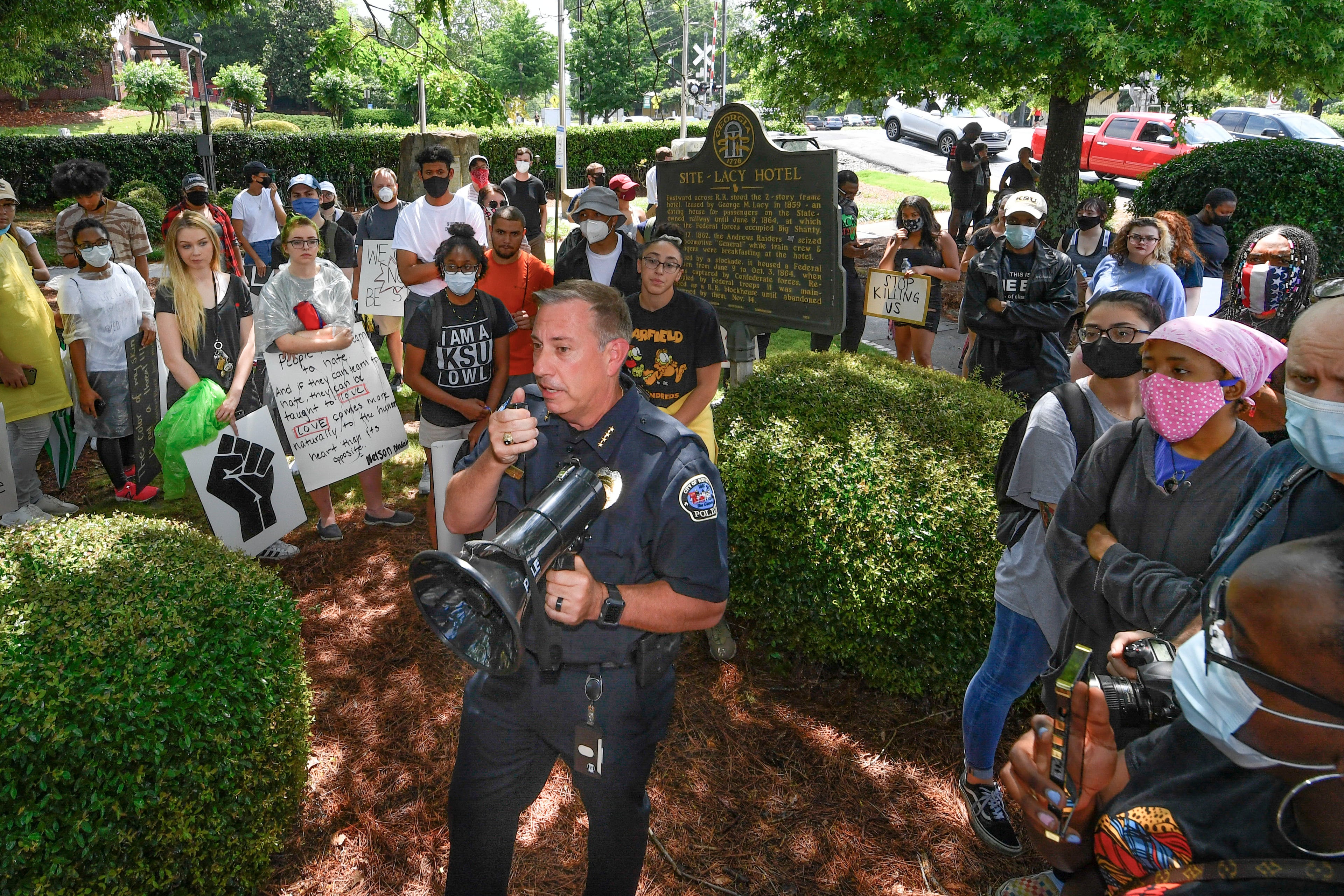A look at major coronavirus related developments over the past week
Public health experts are worried that ongoing protests against racism and police brutality, with throngs of people gathering in the streets, could lead to an uptick in coronavirus cases in the coming weeks.
Across the nation, and in downtown Atlanta and in other parts of the metro area, people are protesting the recent killings of Ahmaud Arbery in Brunswick, Breonna Taylor in Louisville, Ky., and George Floyd in Minneapolis, as well as other instances of racial injustice. Often, demonstrators have stood in close proximity, linking arms and chanting or shouting, sometimes wearing masks and sometimes not.
Health officials are recommending protesters get tested for the coronavirus soon.
Here’s a look at major news related to the coronavirus this past week.

Protests-virus mix worries health chief
Concerned that widespread protests could be new hot spots for the coronavirus, Dr. Kathleen Toomey, the commissioner of the Georgia Department of Public Health, said she plans to set up test sites for demonstrators to screen for the coronavirus.
Toomey said her agency is also working with Atlanta Mayor Keisha Lance Bottoms’ office and other state agencies to test first-responders and National Guard members who may have been exposed. Toomey said pop-up COVID-19 testing sites could be deployed as soon as next week.
“We want to ensure that the pandemic doesn’t spread because of this,” Toomey said at a news conference. Toomey said demonstrations present the risk of continued spread of the virus just as with any mass gathering in which people are in close quarters.

Even so, some health expert said they understand why so many people, even during a pandemic, would feel compelled to protest. Dr. Jay Varkey, associate professor of infectious diseases at Emory University School of Medicine, recommended protesters take steps — such as wearing masks and either goggles or glasses, and to bring hand sanitizer — to lower the risk of exposure.
“If we are going to be honest, we need to acknowledge racism didn’t stop during the pandemic,” said Varkey.
For many people, there’s a need for public expression of solidarity even amid a public health crisis.
“You have a First Amendment right to be present in public spaces to express your views,” said Andrea Young, executive director of ACLU Georgia. Attending a protest “is an individual decision, but certainly we would always encourage people to follow the guidelines of science and health professionals when they are out in public. It is hard to say you should go to the grocery store but not follow your conscience when something is calling you to be present and stand for justice.”
MORE: COMPLETE COVERAGE: Everything you need to know about the coronavirus
MORE: Complete coverage: Atlanta protests
Kemp: Georgia’s revenue — and spending — will drop
Gov. Brian Kemp said the state will have 11% less to spend in the upcoming fiscal year.
About $2.6 billion in spending cuts are anticipated for fiscal 2021, which begins July 1, because of revenue gaps caused by the pandemic.
But that’s slightly better than what had been predicted a month ago.
“Tough decisions will need to be made in your agencies and under the Gold Dome to balance the budget without compromising our values,” the governor told agency leaders in a video message. “This is a challenging moment, but one we are prepared to overcome.”
Under budget plans submitted last month, more than 1,000 jobs would be eliminated, and tens of thousands of state employees would be furloughed.
Some state agencies — including the GBI, the Georgia State Patrol and public defenders — are planning for a scenario in which employees take nearly five weeks off without pay.
Judges — whose staffers would be heavily furloughed — warned of an avalanche of cases once courts open up again. Georgia schools have planned for a $1.5 billion drop in funding, a major loss in revenue for the state’s 180 local K-12 systems.

Hotspot hospital now free of COVID-19 patients
For the first time since the coronavirus pandemic swept into southwest Georgia in early March, Albany-based Phoebe Putney Health System announced a major milestone: no COVID-19 patients left in its main hospital.
It has 42 patients with the disease remaining in Albany at Phoebe North, a coronavirus expansion ward it built for the epidemic, and at its nearby Sumter County hospital.
MORE: At 101, Atlanta woman beats COVID-19; she also survived 1918 pandemic
Jobless claims continue to soar
A flood of jobless claims continued to pour into the state Department of Labor the week ending May 30, even as officials warned that some workers face a loss of benefits.
About 149,163 claims were processed – down slightly from the previous week, but still far more than during the worst month of the Great Recession. Since mid-March, the department has processed more than 2.3 million claims, found 928,1010 of them valid and issued at least a first payment to 715,000 people, according to Mark Butler, the state labor commissioner.
However, many non-teaching school employees who are not paid through the summer face an end to benefits. They are now without work because schools are closed, not because of the pandemic, Butler said during an online briefing with reporters.
Moreover, as restrictions on businesses are lifted, many workers will lose eligibility for benefits, he said.
More than 100,000 jobs are listed on EmployGeorgia.com, and many employers are calling workers back, according to Butler. Workers who are at heightened risk from COVID-19, or who are caring for someone at risk, can continue to receive benefits, but others who say no may lose eligibility.
“Unemployment is not meant to be an income replacement forever,” he said.
Meanwhile, the most robust hiring has been among grocery stores, distribution centers and delivery services.

UGA plans for football as usual this fall
Count the Georgia Bulldogs among the Power 5 programs that are confident there not only will be a full college football season this year — but stands full of fans to watch it.
While tempering their comments with caveats regarding impossible-to-know future developments with the coronavirus pandemic, UGA President Jere Morehead and Athletic Director Greg McGarity spoke optimistically about a close-to-normal college football season.
“Right now, our plan is to move forward and start the season on time and to have a full season,” Morehead said in a question-and-answer session with reporters following Thursday’s meeting of the Georgia athletics board. “I can’t predict events that would change that plan, but that’s the approach that the SEC is operating under.”
Staff writers Nedra Rhone, James Salzer, Michael E. Kanell and Chip Towers contributed to this article.


